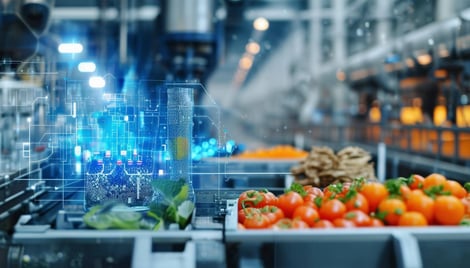
Balancing Carbon Goals and Production Efficiency Using AI Tools in Food and Beverage Manufacturing
Production planners face increasing pressure to optimize efficiency while meeting ambitious sustainability goals. With consumers demanding more eco-friendly products and governments enforcing stricter environmental regulations, balancing carbon reduction initiatives with production efficiency has become a pivotal challenge.
The integration of advanced AI tools like PlanetTogether with enterprise systems such as SAP, Oracle, Microsoft, Kinaxis, or Aveva offers a transformative pathway to achieving this balance.

The Twin Goals: Carbon Reduction and Production Efficiency
Achieving carbon neutrality in manufacturing processes involves reducing greenhouse gas (GHG) emissions across the value chain. This includes everything from sourcing raw materials and optimizing production lines to managing distribution networks. Simultaneously, production planners must ensure high levels of efficiency to maintain profitability, minimize waste, and meet market demand.
Traditionally, these objectives often appeared to be at odds. Efforts to reduce carbon footprints could sometimes lead to higher costs or production delays. However, with the advent of AI-powered solutions, production planners can now identify and implement strategies that align sustainability with operational excellence.

The Role of AI in Balancing Carbon Goals and Efficiency
AI tools like PlanetTogether provide data-driven insights that empower production planners to make informed decisions. When integrated with robust enterprise systems such as SAP, Oracle, Microsoft, Kinaxis, or Aveva, these tools can analyze vast amounts of data to uncover opportunities for optimization.
Key Benefits of AI Integration:
Advanced Scheduling for Energy Efficiency
AI-driven production scheduling tools enable planners to align production schedules with periods of lower energy costs or higher availability of renewable energy. For instance, integrating PlanetTogether with SAP can provide real-time visibility into energy usage patterns, allowing planners to adjust production schedules to minimize energy-intensive processes during peak hours.
Predictive Maintenance for Reduced Downtime
By leveraging machine learning algorithms, AI tools can predict when equipment is likely to fail, enabling proactive maintenance. This reduces unplanned downtime and ensures equipment operates at peak efficiency, directly contributing to lower energy consumption and reduced carbon emissions.
Material and Resource Optimization
AI systems can analyze supply chain and production data to minimize material waste. For example, integrating PlanetTogether with Oracle or Kinaxis allows planners to optimize material usage, reduce excess inventory, and identify opportunities for recycling by-products, thereby reducing the overall carbon footprint.
Scenario Analysis for Carbon Impact
AI-powered tools can simulate various production scenarios to assess their environmental impact. When integrated with Aveva or Microsoft Dynamics, PlanetTogether can provide planners with actionable insights into how different production decisions influence carbon emissions, enabling them to choose the most sustainable options.

Overcoming Challenges in AI Integration
While the benefits are substantial, integrating AI tools like PlanetTogether with enterprise systems can present challenges. Production planners must navigate complexities such as:
Data Integration
Ensuring seamless data flow between AI tools and enterprise systems like SAP or Oracle requires careful planning. Data silos and inconsistencies can hinder the effectiveness of AI-driven insights. Establishing robust data governance practices is critical.
Change Management
Introducing AI solutions often requires a cultural shift within the organization. Planners and operators must be trained to trust and effectively use AI recommendations. Leadership support and comprehensive training programs are essential for smooth adoption.
Scalability and Customization
AI tools must be tailored to the unique needs of each manufacturing facility. Ensuring scalability across multiple plants while accommodating local operational nuances can be challenging but is vital for maximizing ROI.
The integration of AI tools like PlanetTogether with enterprise systems represents a significant leap forward in the journey toward sustainable manufacturing. By enabling production planners to optimize operations while reducing carbon footprints, these technologies empower the food and beverage industry to meet evolving consumer expectations and regulatory demands.
As AI continues to evolve, its role in balancing sustainability and efficiency will only grow more critical. For production planners, now is the time to embrace these tools and lead the way in building a more sustainable future.
Balancing carbon goals and production efficiency is no longer a zero-sum game. With the power of AI tools like PlanetTogether and seamless integration with enterprise systems like SAP, Oracle, Microsoft, Kinaxis, or Aveva, food and beverage manufacturers can achieve remarkable progress in both areas. By adopting these advanced tools, production planners can drive sustainable growth while maintaining the operational excellence that defines their industry.
Are you ready to take your manufacturing operations to the next level? Contact us today to learn more about how PlanetTogether can help you achieve your goals and drive success in your industry.
























LEAVE A COMMENT